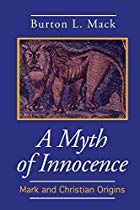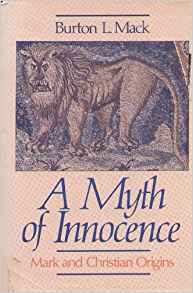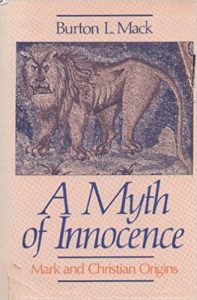 Burton Mack has, for me, some memorable remarks about the nature of the Christianity spawned partly via the medium of the Gospel of Mark. They are found in his conclusion to A Myth of Innocence.
Burton Mack has, for me, some memorable remarks about the nature of the Christianity spawned partly via the medium of the Gospel of Mark. They are found in his conclusion to A Myth of Innocence.
One of several quote-worthy points was this, and it addresses, perhaps without full realization of what Mack himself originally meant, the circularity at the foundation of historical Jesus scholarship.
The Christian gospel is the lens through which Western culture has viewed the world. This means that a refraction of the symbols of transformation has determined the way in which the world has been imagined. Translated into secular systems of human thought and observation, the imaginative scheme has given rise to notions and categories that appear to be self-evident, yet continue to support the Christian construction of reality from which they are derived.
If you are reading this late at night after a long day, or too early in the morning after not quite enough sleep, these words may appear to be too abstract to convey much immediate concrete sense. He is “simply” saying that we Westerners have come to view the world and life experiences very largely through Christian concepts, or through thoughts (or memes) that only make much sense to those brought up in a culture that has imbibed much from Christianity over the centuries. Before I make it even more complicated, I’ll let Mack get to the point:
Self-evident categories are difficult to expose because they stem from the matrix of fundamental interests and attitudes that govern social identities and the sense to be made of human activity and intercourse both at the intellectual and the practical levels of endeavor. The example used to investigate this phenomenon in the present study is the notion of origin, a self-evident category that has determined the scholarly quest to understand how Christianity began.
Now we are beginning to see something distinctive about Christian cum Western culture. There is a certain view of origins that has permeated Western culture and that can be traced to Church teaching.
Mack continues by stating that we take this particular view of origins for granted and thus fail to recognize that it derives from the Christian myth that has been at the foundations of our culture.
The scholarly investigation of Christian origins has proceeded in terms of critical methods drawn from the humanistic traditions. The guiding vision, however, has been some imagined event of transformation that might account for the spontaneous generation of the radically new perception, social formation, and religion that Christianity is thought to have introduced to the world. Because this notion of origins has been assumed as self-evident, its derivation from Christian mythology has not been examined. The results of this scholarship, therefore, have been secular apologies for the truth of Christian claims to unique foundations, even though the purpose of the enterprise as a whole has been purportedly self-critical. (p. 368)
Which, coincidentally, is exactly what I have been arguing in part through the past so many posts. Even nonChristian biblical scholars are bound up in the iconic myth of Christianity and fail to recognize they are merely perpetuating this myth, for all their sophisticated socio-economic or psychological and political critiques. They cannot see the circularity of their assumptions. Not even when they think of themselves as “independent” scholars.
Doherty, whether consciously or not, appears to have acknowledged this failing in mainstream explanations for Christian origins, and proposed even more radically than did Burton Mack an origin for Christianity that cannot be traced to a romantic heroic foundational figure, but that was the outcome of a series of evolutionary fits and starts on which today’s myth was later imposed.
Major social and religious movements, like major political and economic ones, rarely do start from a single heroic founding fathers. But we do know that mythical founders have always been created to explain customs and beliefs of a later age.
If historical Jesus proponents insist that the “Jesus myth” was set in times far too recent to be adopted as a plausible lie, they are simply repeating the circularity of arguing from the assumptions of the myth itself.
Like this:
Like Loading...
 Bill Arnal and Leif E. Vaage are not the only scholars who have published doubts about the historicity of the baptism of Jesus by John the Baptist. I mentioned them back in January this year. Another was Burton Mack in Myth of Innocence. (The evidence against historicity is in my view overwhelming. I have shown the weakness of the arguments by E. P. Sanders for its historicity and posted before on how the scenes can be explained entirely in terms of literary function and artifice without any need to resort to assumptions of extraneous events outside the text.) But for sake of completeness here is Burton Mack’s argument for treating it as entirely mythical. I highlight in bold type the reasons he sees evident for the need or wish of early Christians to invent the episode. Far from the scene being an embarrassment to the first Christians to have heard the story, it was surely welcomed. Only later evangelists reading Mark’s gospel felt embarrassment over Mark’s account because they had quite different views of Jesus.
Bill Arnal and Leif E. Vaage are not the only scholars who have published doubts about the historicity of the baptism of Jesus by John the Baptist. I mentioned them back in January this year. Another was Burton Mack in Myth of Innocence. (The evidence against historicity is in my view overwhelming. I have shown the weakness of the arguments by E. P. Sanders for its historicity and posted before on how the scenes can be explained entirely in terms of literary function and artifice without any need to resort to assumptions of extraneous events outside the text.) But for sake of completeness here is Burton Mack’s argument for treating it as entirely mythical. I highlight in bold type the reasons he sees evident for the need or wish of early Christians to invent the episode. Far from the scene being an embarrassment to the first Christians to have heard the story, it was surely welcomed. Only later evangelists reading Mark’s gospel felt embarrassment over Mark’s account because they had quite different views of Jesus.
 In
In 
